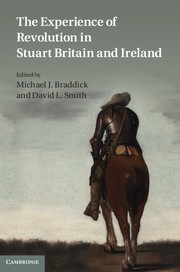Book contents
- Frontmatter
- Contents
- Notes on contributors
- Preface
- List of abbreviations
- JSM
- Introduction: John Morrill and the experience of revolution
- 1 The Scottish–English–Romish Book: the character of the Scottish Prayer Book of 1637
- 2 Popery in perfection? The experience of Catholicism: Henrietta Maria between private practice and public discourse
- 3 Sir Benjamin Rudyerd and England's ‘wars of religion’
- 4 Rhetoric and reality: images of Parliament as Great Council
- 5 Cathedrals and the British Revolution
- 6 History, liberty, reformation and the cause: Parliamentarian military and ideological escalation in 1643
- 7 Sacrilege and compromise: court divines and the king's conscience, 1642–1649
- 8 Law, liberty, and the English Civil War: John Lilburne's prison experience, the Levellers and freedom
- 9 On shaky ground: Quakers, Puritans, possession and high spirits
- 10 James Harrington's prescription for healing and settling
- 11 ‘The Great Trappaner of England’: Thomas Violet, Jews and crypto-Jews during the English Revolution and at the Restoration
- 12 The Cromwellian legacy of William Penn
- 13 Irish bishops, their biographers and the experience of revolution, 1656–1686
- 14 Religion and civil society: the place of the English Revolution in the development of political thought
- Bibliography of the major writings of John Morrill, 1967–2009
- Index
9 - On shaky ground: Quakers, Puritans, possession and high spirits
Published online by Cambridge University Press: 05 August 2011
- Frontmatter
- Contents
- Notes on contributors
- Preface
- List of abbreviations
- JSM
- Introduction: John Morrill and the experience of revolution
- 1 The Scottish–English–Romish Book: the character of the Scottish Prayer Book of 1637
- 2 Popery in perfection? The experience of Catholicism: Henrietta Maria between private practice and public discourse
- 3 Sir Benjamin Rudyerd and England's ‘wars of religion’
- 4 Rhetoric and reality: images of Parliament as Great Council
- 5 Cathedrals and the British Revolution
- 6 History, liberty, reformation and the cause: Parliamentarian military and ideological escalation in 1643
- 7 Sacrilege and compromise: court divines and the king's conscience, 1642–1649
- 8 Law, liberty, and the English Civil War: John Lilburne's prison experience, the Levellers and freedom
- 9 On shaky ground: Quakers, Puritans, possession and high spirits
- 10 James Harrington's prescription for healing and settling
- 11 ‘The Great Trappaner of England’: Thomas Violet, Jews and crypto-Jews during the English Revolution and at the Restoration
- 12 The Cromwellian legacy of William Penn
- 13 Irish bishops, their biographers and the experience of revolution, 1656–1686
- 14 Religion and civil society: the place of the English Revolution in the development of political thought
- Bibliography of the major writings of John Morrill, 1967–2009
- Index
Summary
The impact of the emergence of ‘Quakers’ on the contested field of religious orthodoxy and propriety in the 1650s, particularly when measured by the means of print exchanges, was considerable. While the ‘actual’ impact in terms of numbers is easily exaggerated, this should not lessen attention paid to the vicious negotiation of the arguments, portrayals and counter-portrayals. These negotiations made a crucial contribution to the process of identity among ‘liberated’ radicals, possibly those strongest in their denunciations of the Quakers and, to an even greater extent, the more plastic identity of the emergent group. I intend to bring different light on this process using the lens of the discourse of possession, and what follows is a case study with the central concern of possession, of good or evil spirits, means of discernment and treatment, and the context-dependent apprehension and representation of physical and spiritual ‘symptoms’. I have chosen this particular field for a number of reasons, not least because the role of contested readings of possessions in the formation of early Quaker identity has been underestimated or under-explored. Certainly we have benefited from attention paid to the anti-popery and the witchcraft tropes in the literature against the early Quakers (not unconnected to possession), but focus on possession opens new windows which, I hope, will prove profitable.
- Type
- Chapter
- Information
- The Experience of Revolution in Stuart Britain and Ireland , pp. 172 - 189Publisher: Cambridge University PressPrint publication year: 2011

